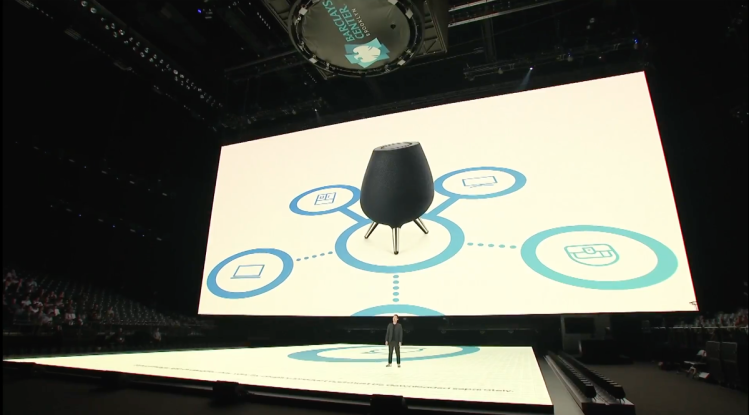Watch all the Transform 2020 sessions on-demand here.
Google Home has the Google Home Mini. Amazon’s Echo has the Echo Dot. And when Samsung’s Bixby-driven smart speaker — the Galaxy Home — debuts sometime in 2019, it might have its own entry-level counterpart.
That’s according to SamMobile, which in a report today claimed that Samsung will release at least one other speaker next year in addition to the Galaxy Home. It will reportedly bear the model number “SM-V310” — not too far off from the Galaxy Home’s SM-V510 — and come in black.
Where features are concerned, Samsung’s second smart speaker will presumably be on par with its big brother. And it’s almost a guarantee that it’ll run Bixby 2.0, the next-gen version of Bixby that Samsung previewed at Mobile World Congress 2018 in March.
Bixby 2.0 boasts better natural language processing and faster response times than its predecessor, along with built-in noise reduction tech. It’s also more conversational — if you ask it about upcoming concerts around New Year’s, for example, it’ll remember the date range when looking for tickets in the future. And it can make recommendations based on your previous searches.
June 5th: The AI Audit in NYC
Join us next week in NYC to engage with top executive leaders, delving into strategies for auditing AI models to ensure fairness, optimal performance, and ethical compliance across diverse organizations. Secure your attendance for this exclusive invite-only event.
At a press event in August, Samsung revealed that the Galaxy Home has functionality now considered standard issue for smart speakers, such as the ability to play music and control smart home devices without the need to lift a finger. It boasts AKG-tuned omnidirectional speakers and a subwoofer for deep bass, plus an array of eight microphones for far-field voice recognition.
Smart speaker demand
Market momentum for smart speakers shows no sign of slowing — quite the opposite, in fact. A report published by research firm Canalys indicates that worldwide smart speaker shipments grew 137 percent year over year in the third quarter of 2018 to reach 19.7 million units, up from 8.3 million in Q3 2017.
The number of voice-enabled speakers in use could come close to 100 million by the end of this year (up from 50 million at the end of 2017), some suggest, and early momentum more or less aligns with that prediction.
NPR and Edison Research estimated in July 2018 that 18 percent of American adults — around 43 million people — owned a smart speaker. (Consumer Intelligence Research Partners and Voicebot put the number at 50 million and 47.3 million, respectively.)
According to a survey commissioned by Adobe, almost half of all consumers in the United States will own a smart speaker by the end of the year. And a Global Market Insights report forecasts that the global smart speaker market could be worth as much as $30 billion by 2024.


